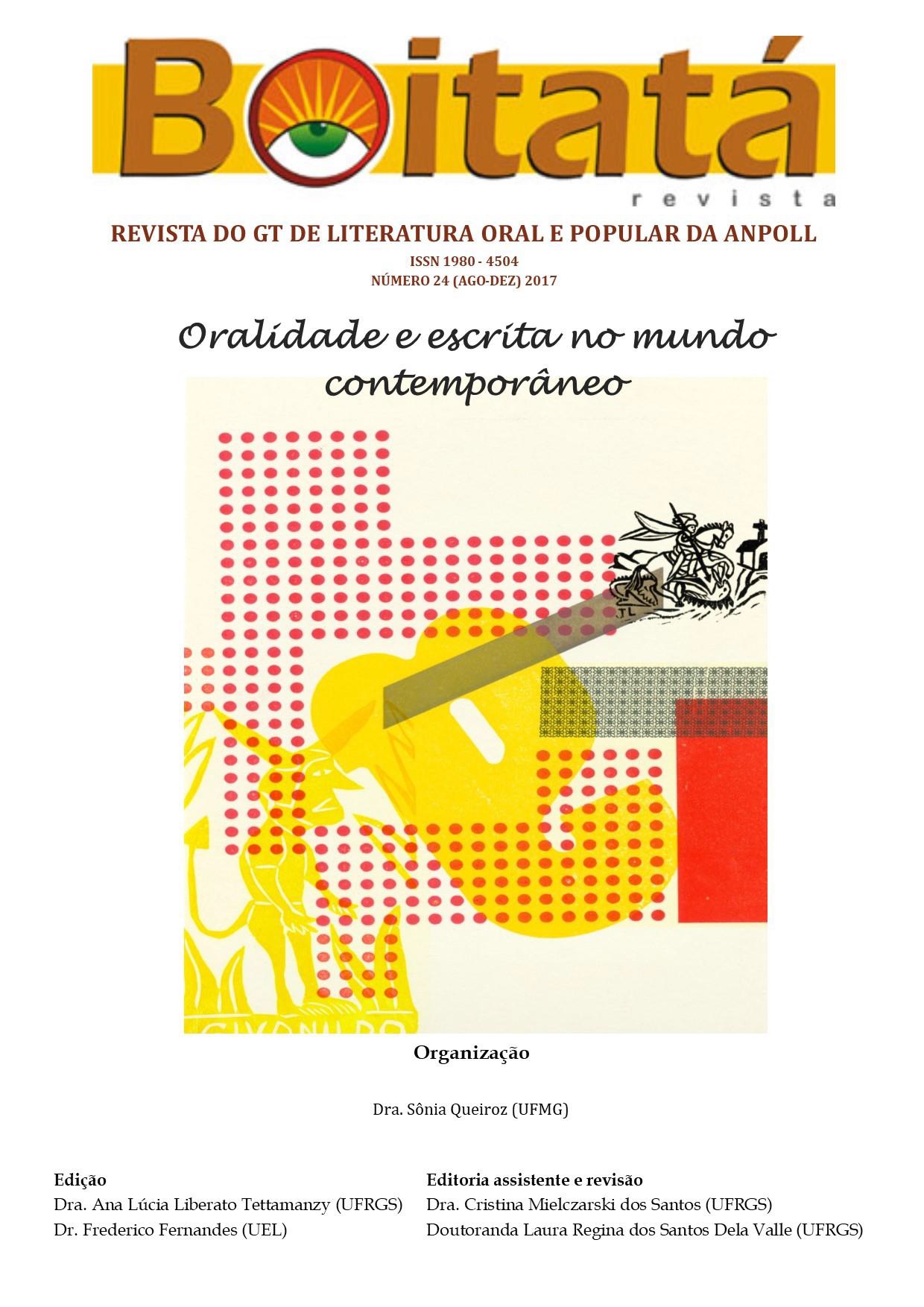A Boi Fugido, a history of mouth in letter
DOI:
https://doi.org/10.5433/boitata.2017v12.e32946Keywords:
Ox cycle, Oral tradition, Movement.Abstract
The poetry of oral tradition in Brazil presents a cycle of narrative poems that have the ox as central character. The narrative develops around an ox that does not allow itself to be arrested and attempts to capture it by different cowboys. This cycle of poems is linked to Brazilian history itself, in which livestock activity plays an important role. Among the varied narratives that make up this cycle of poems, the "Rabicho da Geralda". The first publication of this poem known in Brazil was made by José de Alencar, at the end of the 19th century. Four more versions will be covered here in a comparative analysis, three published by Sílvio Romero, José Rodrigues de Carvalho and Antônio Americano do Brasil, respectively, in 1883, 1903 and 1925. Still a fourth version is taken from a manuscript by Pedro Braga, a storyteller from Minas Gerais. At different versions of the poem reveal the movement present in the poetic expressions of oral tradition that are inscribed next to printed or handwritten text.
Downloads
References
BRAGA, Pedro Cordeiro. [Manuscritos].
BRASIL, Antônio Americano do. Cancioneiro de trovas do Brasil Central. 2. ed. Goiânia: Gráfica do Livro Goiano, 1973.
CAMPOS, Haroldo de. Deus e o diabo no Fausto de Goethe. São Paulo: Perspectiva, 1981.
CARVALHO, José Rodrigues de. Cancioneiro do Norte. 3. ed. Rio de Janeiro: Instituto Nacional do Livro, 1967.
CASCUDO, Luís da Câmara. Literatura oral no Brasil. 3. ed. Belo Horizonte: Itatiaia; São Paulo: Editora da Universidade de São Paulo, 1984.
CASCUDO, Luís da Câmara. Vaqueiros e cantadores. Belo Horizonte: Itatiaia; São Paulo: Editora da Universidade de São Paulo, 1984.
NASCIMENTO, Bráulio do. O ciclo do boi na poesia popular. In: DIÉGUES JÚNIOR, Manuel et al. Literatura popular em verso: estudos. Belo Horizonte: Itatiaia; São Paulo: EDUSP; Rio de Janeiro: Fundação Casa de Rui Barbosa, 1986.
PRADO JÚNIOR, Caio. Formação do Brasil contemporâneo: colônia. São Paulo: Companhia das Letras, 2011.
ROMERO, Sílvio. Cantos populares do Brasil. Rio de Janeiro: Livraria José Olympio Editora, 1954.
ROSA, João Guimarães Rosa. Manuelzão e Miguilim. 12. ed. Rio de Janeiro: Nova Fronteira, 2016.
SOUZA, Josiley Francisco de. Pedro Braga: uma voz no Vau. 2006. Dissertação (Mestrado em Literatura Brasileira) - Faculdade de Letras, Universidade Federal de Minas Gerais, Belo Horizonte, 2006.
ZUMTHOR, Paul. A letra e a voz: a "literatura" medieval. Tradução de Jerusa Pires Ferreira e Amálio Pinheiro. São Paulo: Companhia das Letras, 1993.
ZUMTHOR, Paul. Introdução à poesia oral. Tradução de Jerusa Pires Ferreira, Maria Lúcia Diniz Pochat e Maria Inês de Almeida. São Paulo: Hucitec, 1997.
Downloads
Published
How to Cite
Issue
Section
License
Copyright (c) 2017 Boitatá

This work is licensed under a Creative Commons Attribution 4.0 International License.
Boitatá esta licenciada com CC BY sob essa licença é possível: Compartilhar - copiar e redistribuir o material em qualquer suporte ou formato. Adaptar - remixar, transformar, e criar a partir do material, atribuindo o devido crédito e prover um link para a licença e indicar se mudanças foram feitas.






















